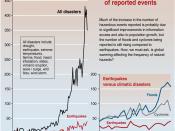INTRODUCTION
The idea of âÂÂâÂÂprotecting the environment has its origins in the second half of the nineteenth century. In Europe, it emerged from the movement in response to the dynamic process of industrialization and urban sprawl, and an increasing level of air and water pollution. The United States was founded as a result of growing concerns about the state of the natural resources of the country, supported by key philosophical references such outstanding individuals like John Muir or Henry David Thoreau. Both conservation priorities, as well as the belief in the hereditary nature of the law are the foundations for today's efforts to protect the environment. In the twentieth century, the popularity and the level of knowledge about the environment continue to grow.
United Nations and Environment
Changing ideas and thinking about the world's environment is where the UN has probably had its greatest influence. Over the six decades since the UN's founding, global awareness, thinking, concern, and global policy in relation to the environment have changed beyond recognition.
As with human rights, the UN has often taken the international lead that has challenged and changed national and international priorities.
The landmarks of these changes include:
1962: The UN Declaration on Permanent Sovereignty over Natural Resources detailed the rights of countries to freely manage natural resources for the benefit of the population and national economic development.
1972: The UN Conference on the Human Environment in Stockholm pioneered the idea that issues of environment and development must be approached together, politically and operationally.
1982: The UN Convention of the Law of the Sea gave rise to extended resource rights for coastal states, protection of the marine environment, and an international deep-seabed regime based on the nascent principle of the common heritage of humankind. The latter principle counterbalanced rights of fishing with...


